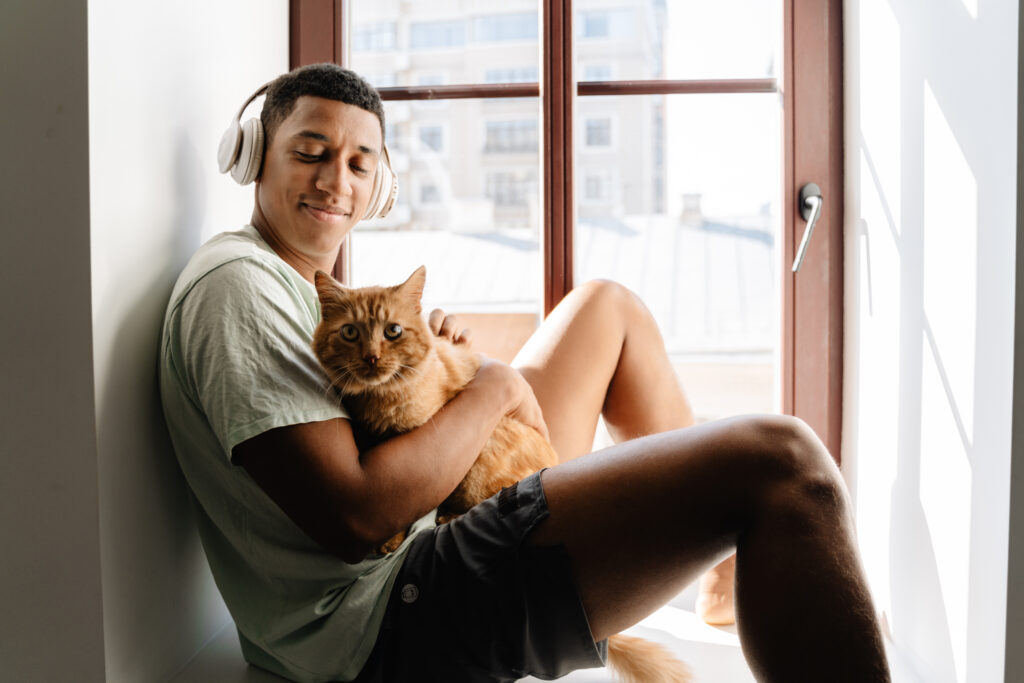The ripple effect of secondhand smoke
Learn about the often-overlooked consequences secondhand smoke exposure has on the people and pets in our lives.
The word “tobacco” in this article refers to commercial tobacco created and sold by tobacco companies, not tobacco that is used spiritually and ceremonially by indigenous tribes.
We all know our personal choices have effects that extend beyond ourselves. It’s why we make the conscious decision to not check our phones when we drive or walk the dog even when we’re exhausted and would rather binge watch a good show. But, when it comes to tobacco and nicotine use, it’s easy to think it’s a choice that only impacts oneself.
Secondhand smoke, the smoke created from the burning end of a cigarette and exhaled out, poses a serious health risk to those around us. In this blog post, we’ll discuss the often-overlooked consequences of secondhand smoke exposure on our family, guests, pets, and the even lesser-known threats of thirdhand smoke. Our decision to quit smoking is not just about our own well-being, but about safeguarding the health of those we care about most.
The impact on people
Secondhand smoke is linked to respiratory illnesses like pneumonia and bronchitis, and it can have persistent adverse effects on lung function in children (1). Exposure to people who do not smoke is estimated to cause around 7,300 lung cancer deaths and 34,000 cardiovascular disease deaths annually (1). Additionally, secondhand smoke is responsible for the premature death of 41,000 adults and more than 400 infants each year (1).
Individuals who do not smoke but are exposed to secondhand smoke face a 25%-30% higher risk of cardiovascular disease and a 20%-30% higher risk of lung cancer (1). Their risk of stroke also increases by about 20%-30% (1).
The impact on pets
Our pets are also at risk from secondhand smoke. Dogs and cats that share our homes are at double the risk for developing lung cancer if we smoke (1). The smoke particles settle on their fur and skin, exposing them to the same heart disease, cancer and respiratory disease risks as with humans (2). This residue contains hazardous chemicals like nicotine, formaldehyde and cancer-causing substances. When pets lick their fur, they ingest these harmful chemicals, which puts them at risk for cancer (2).

The menace of thirdhand smoke
A hazardous residue called thirdhand smoke affects not only our pets, but also is a real danger in any home. It is often overlooked.
When you smoke tobacco, residue slowly accumulates on indoor surfaces. This residue includes nicotine and dangerous carcinogens, or cancer-causing chemicals, such as formaldehyde. Over time, it becomes a part of the environment, clinging to surfaces and is difficult to remove (3).
People who touch contaminated surfaces or inhale gases released by thirdhand smoke are exposed to its harmful chemicals (3). Even if you don’t smoke around your guests, they might still be at risk in your home. Smoke particles permeate walls, furniture, and even appliances, which turns your living space into a potential health hazard.
Choose to protect
The best way to protect others is to quit smoking. Quitting is a profound decision with positive consequences that resonate far beyond ourselves. When we quit, we break the chain of secondhand and thirdhand smoke exposure, preventing respiratory illnesses, heart diseases, cancers and other health issues from affecting those around us. If quitting seems overwhelming, there are resources available to help you succeed. Through https://waytoquit.org/, you can access free and proven quit services such as phone calls with a quit coach, nicotine replacement therapies (NRTs) like nicotine patches, lozenges, and gum, and a quit plan built just for you. These services are in place to help make your quit journey a little easier.
Quit smoking, protect lives.
Make the powerful choice to turn your home, car and shared areas into smoke-free places that everyone in your life can enjoy. You don’t have to do it alone. There are tools and support available to help you create a future without smoking, where everyone can breathe freely and live well.
Sources
1. https://truthinitiative.org/research-resources/harmful-effects-tobacco/impactsecondhand-smoke 2. https://www.lung.org/blog/dont-puff aroundpets#:~:text=Increased%20respiratory%20disease%3A%20Just%20like,when%20exposed%20to%20secondhand%20smoke 3. https://www.mayoclinic.org/healthy-lifestyle/adult-health/expert-answers/thirdhand-smoke/faq-20057791
Get Help Quitting
If you’re ready to quit, we’re ready to help. Just pick the tools, free services or combinations you like best. They’re all proven to help you succeed. Get started today.